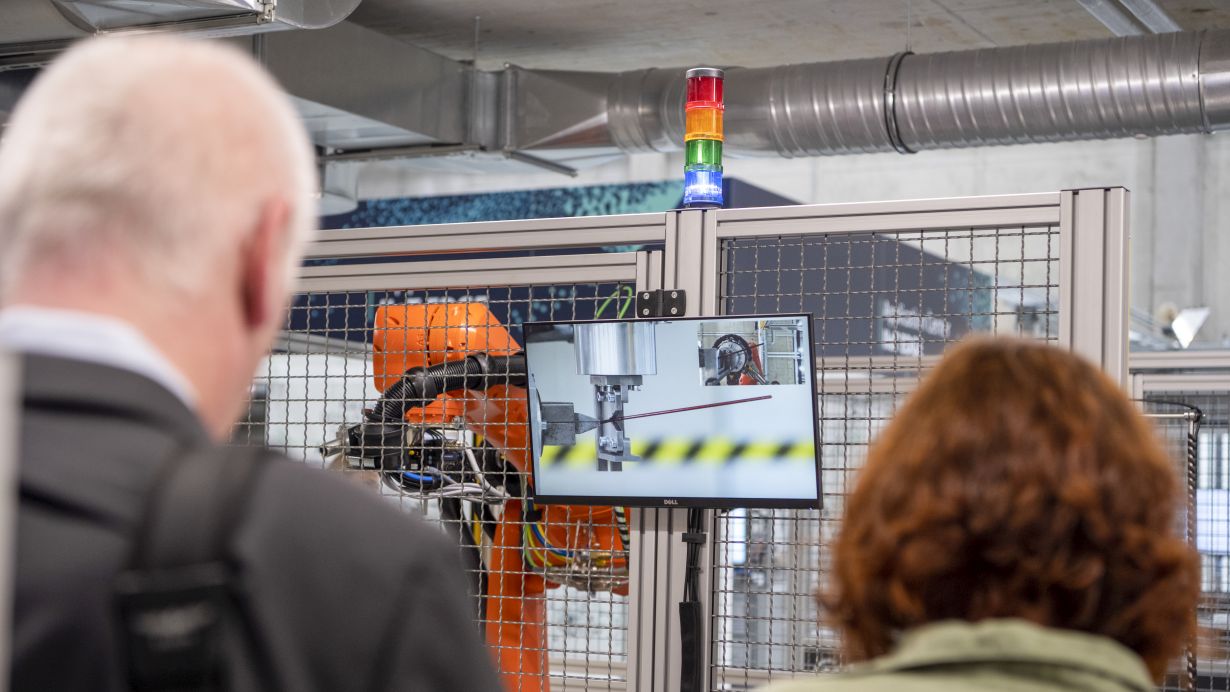
New cooperation structures, cross-border founding programs, and a long-term network for knowledge transfer in the three-border region between Germany, France, and Switzerland: This is the summary of the successful "Knowledge Transfer Upper Rhine" project (KTUR). Twelve university partners set the course for the project under the leadership of KIT, with many regional companies and trade associations as partners. On Thursday, September 22, 2022, from 2:30 p.m. to 4:45 p.m., the project partners present their results.
The goals unifying all partners are a closer collaboration in research and transfer as well as cross-border founding opportunities in order to strengthen the region's competitive position. The KTUR pilot project started in October 2019 with the goal of significantly reducing existing barriers to facilitate and increase contacts and project initiation between universities and companies in the Upper Rhine region. To do so, the project team established novel exchange and meeting formats, as well as new collaboration structures. Additionally, the participating universities developed joint trinational programs in the areas of startups and founding, trainings, and innovation events. They also created the online platform "KTUR Innovation X" that allows companies quick and easy access to technologies from the whole region and provides a central point of contact for different activities in the areas of research, transfer, founding, and startup development.
Cross-border Network for Trinational Knowledge Transfer Established
The EU project KTUR made the excellence at universities of the Upper Rhine region more visible on a global level. Using the new network, participants from research and industry can face the challenges of society like the energy transition and climate change and initiate suitable innovation projects. "For future-proof innovations, we need to collaborate and exchange knowledge internationally, overcoming geographical borders and integrating different disciplines", KIT Vice-President for Transfer and International Affairs Professor Thomas Hirth clarifies. "With KTUR, we managed to create a platform for the exchange of best practice examples between universities and companies, align the knowledge and technology transfer in the Upper Rhine region trinationally, and establish entirely new synergies."
The project partners from the startup sector introduced numerous opportunities for networking and further training, for example the KTUR Startup & Innovation Nights, a trinational summer school on entrepreneurship, or the KTUR Startup Talks taking place on a regular basis. Cross-border training courses with participants from local companies presented an opportunity for exchange. Transfer events on a smaller scale on different application-oriented topics were targeted at the industry and multipliers. A trinational innovation day taking place in Strasbourg in April 2022 with more than 1000 participants became a cross-border meeting place for innovators from the whole region.
Professor Michel de Mathelin, Senior Vice Chairperson of the University of Strasbourg and Vice Chairperson for Relations with the Socio-economic World and Transfer, states: "Our goal for the future is to promote relationships and promising projects between the academic world, the economy, and society with these kinds of events. The most important aspects are enabling this collaboration to be sustainable and establishing new dialogs that benefit innovation, the companies, and the development of cross-border relations."
The KTUR network is set to remain in place beyond the end of the project. (sfo)
Hybrid concluding event: Knowledge Transfer Upper Rhine (KTUR)
Thursday, September 22, 2022, from 2:30 p.m. to 4:45 p.m.
Tulla lecture hall and Foyer in building 11.40 at KIT Campus South, Englerstraße 11, 76131 Karlsruhe
(Livestream on the Internet)
| The event will be in English. | |
From 2 p.m. |
Welcome |
2:30 - 3:30 p.m. |
Opening and greeting Professor Thomas Hirth, KIT Vice-President for Transfer and International Affairs Dr. Hans Reiter, Director-General at the Baden-Württemberg Ministry of Science, Research, and the Arts Irène Weiss, regional council member and Deputy Chairperson of the Higher Education, Research, and Innovation Committee of the Grand Est Region Dr. Ariane Bürgin, Head of the university sector of the Education Department of the canton Basel-Stadt |
3:30 - 4:30 p.m. |
Presenting the results of the "Knowledge Transfer Upper Rhine" (KTUR) project Discussion: How did the project contribute to bringing research and industry closer and creating a trinational innovation network in the Upper Rhine region? Speakers: Dagmar Vössing, Head of Technology Transfer, KIT Dr. Alessandro Mazzetti, Manager, Innovation Alliances, University of Basel Professor Martin Haimerl, Scientific Director at Tuttlingen Innovation and Research Center of Furtwangen University (IFC) Professor Franz Quint, Vice-President of Research, Cooperation, and Quality Management of the Karlsruhe University of Applied Sciences Dr. Frauke Lorenzen, KTUR Project Manager, University of Freiburg Startup Office Professor Michel de Mathelin, Senior Vice Chairperson of the University of Strasbourg and Vice Chairperson for Relations with the Socio-economic World and Transfer Presenter: Dr. Olivia Wohlfart, KIT |
4:30 - 5:45 p.m. |
Closing Prof. Thomas Hirth and Prof. Michel de Mathelin |
| Subsequent reception und networking | |






